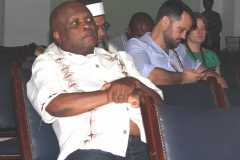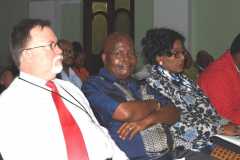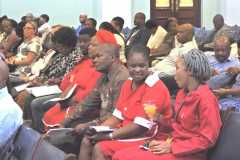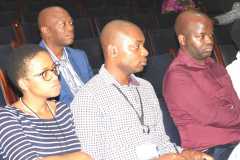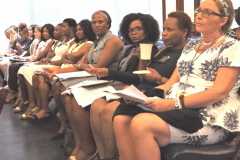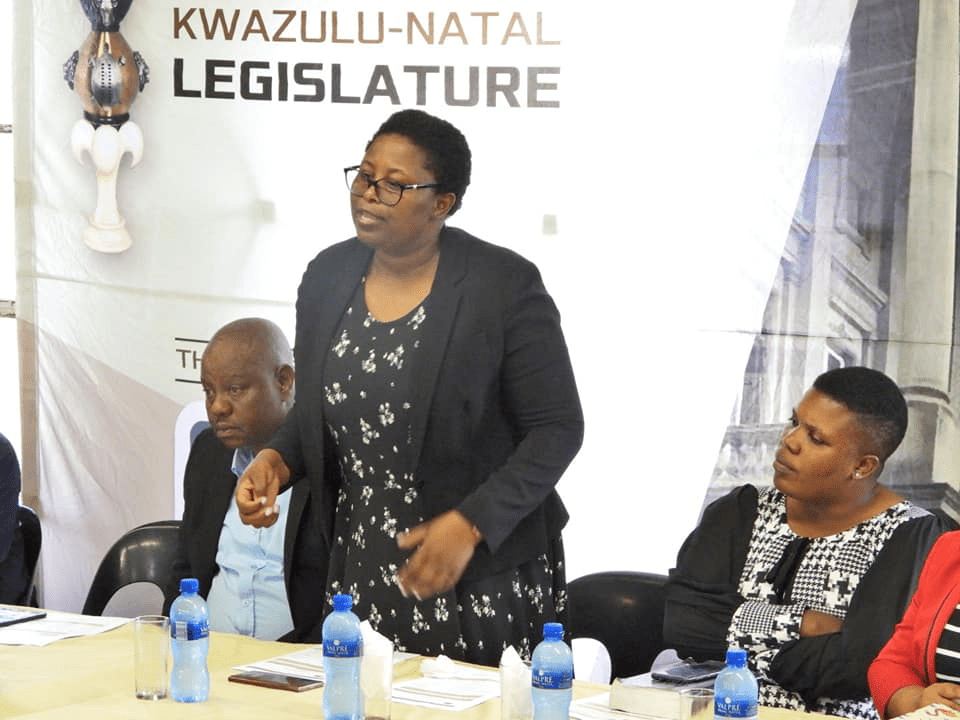President Cyril Ramaphosa: Extension of Coronavirus COVID-19 lockdown to the end of April
President Cyril Ramaphosa: Extension of Coronavirus COVID-19 lockdown to the end of April
My Fellow South Africans,
At midnight tonight, it will be exactly two weeks since our country entered into an unprecedented nation-wide lockdown to contain the spread of the coronavirus.
During the course of these last two weeks, your lives have been severely disrupted, you have suffered great hardship and endured much uncertainty.
We have closed our borders to the world, our children are not in school, businesses have closed their operations, many have lost their income, and our economy has ground to a halt.
And yet, faced with such daunting challenges, you, the people of South Africa, have responded with remarkable patience and courage.
You have respected the lockdown and largely observed the regulations.
You have accepted the severe restrictions on your movement and many of the daily freedoms that we all take for granted.
You have done so because you have understood the devastating effect that this disease will have on the health and well-being of all South Africans unless we take drastic measures.
You have also understood that we must do everything in our power to prevent the massive loss of life that would occur if we did not act.
For your cooperation, for your commitment and above all for your patience, I wish to thank you personally.
I wish to thank you for reaffirming to each other and to the world that we South Africans are a people who come together and unite at moments of great crisis.
Earlier today I had a most productive meeting with our Premiers about the work they are doing in provinces and districts to stop the spread of the virus.
I also had a discussion with the leaders of all our political parties represented in Parliament, who collectively pledged their support for the efforts that are being made to combat the pandemic.
Through this we are demonstrating that we are able to work together across party lines to confront a common threat.
Since I announced the lockdown just over two weeks ago, the global coronavirus pandemic has worsened.
Two weeks ago, there were 340,000 confirmed coronavirus cases in the world.
We now have over 1.5 million confirmed cases worldwide.
Over 90,000 people across the world have died from this disease.
The health systems of many countries have been overwhelmed.
Even the most developed economies in the world have not had the means to treat the many thousands who have fallen ill.
They have struggled to find the medical supplies and personnel necessary to deal with the pandemic.
The devastating effect of this is that many people have died.
The global evidence is overwhelming.
It confirms that our decision to declare a national state of disaster and to institute a nation-wide lockdown was correct and it was timely.
While it is too early to make a definitive analysis of the progression of the disease in South Africa, there is sufficient evidence to show that the lockdown is working.
Since the lockdown came into effect, the rate at which new cases have been identified here in South Africa has slowed significantly.
From 1,170 confirmed cases on the 27th of March, the number of confirmed cases today stands at 1,934.
In the two weeks before the lockdown, the average daily increase in new cases was around 42%.
Since the start of the lockdown, the average daily increase has been around 4%.
While we recognise the need to expand testing to gain a better picture of the infection rate, this represents real progress.
The measures we have taken – such as closing our borders and prohibiting gatherings – as well as the changes that we have each had to make in our own behaviour, have definitely slowed the spread of the virus.
But the struggle against the coronavirus is far from over.
We are only at the beginning of a monumental struggle that demands our every resource and our every effort.
We cannot relax. We cannot be complacent.
In the coming weeks and months, we must massively increase the extent of our response and expand the reach of our interventions.
We are learning both from the experiences of other countries and from the evidence we now have about the development of the pandemic in South Africa.
Both make a clear and compelling case to proceed in a manner that is cautious and properly calibrated.
Simply put, if we end the lockdown too soon or too abruptly, we risk a massive and uncontrollable resurgence of the disease.
We risk reversing the gains we have made over the last few weeks, and rendering meaningless the great sacrifices we have all made.
Fellow South Africans,
This evening, I stand before you to ask you to endure even longer.
I have to ask you to make even greater sacrifices so that our country may survive this crisis and so that tens of thousands of lives may be saved.
After careful consideration of the available evidence, the National Coronavirus Command Council has decided to extend the nation-wide lockdown by a further two weeks beyond the initial 21 days.
This means that most of the existing lockdown measures will remain in force until the end of April.
We will use the coming days to evaluate how we will embark on risk-adjusted measures that can enable a phased recovery of the economy, allowing the return to operation of certain sectors under strictly controlled conditions.
We will also use this time to ramp up our public health interventions.
We did not take this decision to extend the lockdown lightly.
As your President, I am mindful of the great and heavy burden this will impose on you.
I am keenly aware of the impact this will have on our economy.
But I know, as you do, that unless we take these difficult measures now, unless we hold to this course for a little longer, the coronavirus pandemic will engulf, and ultimately consume, our country.
We all want the economy to come back to life, we want people to return to work, we want our children to go back to school, and we all want to be able to move freely again.
But our immediate priority must remain to slow down the spread of the virus and to prevent a massive loss of life.
We must do this while preventing our economy from collapsing and saving our people from hunger.
We are determined to pursue a path that both saves lives and protects livelihoods.
Our strategy is made up of three parts:
– Firstly, an intensified public health response to slow down and reduce infections.
– Secondly, a comprehensive package of economic support measures to assist businesses and individuals affected by the pandemic.
– Thirdly, a programme of increased social support to protect poor and vulnerable households.
As government, together with our many partners, we have used this lockdown period to both refine and intensify our public health strategy to manage the coronavirus.
Our approach is to screen in communities and test people in hospitals, clinics and mobile clinics, to isolate those who are infected, and to care for those who are ill in our health facilities.
We need to do this intensively and systematically.
We have used the last week to develop our screening and testing methodology in various parts of the country.
Over the next two weeks, we will roll out the community screening and testing programme across all provinces, focusing in particular on highly vulnerable communities.
Those who test positive and cannot self-isolate at home will be isolated at special facilities that have been identified and are now being equipped.
At all times, we will observe the human rights of all people.
Let us not discriminate against people who test positive.
To ensure that our strategies are effectively coordinated and to ensure they are informed by comprehensive, real-time data, we have established the COVID-19 Information Centre at the Council for Scientific and Industrial Research.
This world-class centre will keep track of all screening, testing, isolation and hospitalisation throughout the country.
It is already identifying infection hotspots.
It is following the spread and the severity of the disease, and enabling us to move our focus and resources where they are most needed.
We are working with mobile telephony companies and other institutions to locate those people who have tested positive for the virus and those with whom they have been in contact.
As part of the second element of our strategy, we have put in place various measures to provide support to businesses in distress, to workers facing loss of income, to the self-employed and to informal businesses.
Many of these measures are being taken up by both large and small businesses.
The Unemployment Insurance Fund has set aside R40 billion to help employees who will be unable to work, as part of the effort to prevent jobs losses as a result of the lockdown.
To date, it has paid out R356 million.
I would like to applaud all those employers who have continued to pay their workers during this difficult time, as well as those employers who are working with unions and government to assist their employees to access these benefits.
I would like to call on all businesses to continue to pay their suppliers, to the extent that they can, to ensure that those suppliers can also continue to operate and pay their staff and suppliers.
In this respect, I would like to appeal to all large businesses not to resort to force majeure and stop paying their suppliers and rental commitments, as such practice has a domino effect on all other businesses dependent on that chain.
We must do all we can to ensure that the underlying economy continues to function and to focus support on those small businesses that really need them.
The Industrial Development Corporation has set aside R3 billion for the procurement of essential medical supplies.
It has already approved R130 million in funding and expects to approve a further R400 million in the coming week to companies who applied for funding under this special facility.
The Small Enterprise Finance Agency has approved the postponement of loan repayments for a period of 6 months.
The small business debt relief and business growth facilities are currently adjudicating applications for assistance.
There is a total of R500 million available in support.
Government has reprioritised R1.2 billion to provide relief to smallholder farmers and to contribute to the security of food supply.
In addition to these expenditure measures, the Reserve Bank has also lowered interest rates and has taken measures to inject liquidity into the economy.
One of the biggest challenges that all countries in the world are facing is the shortage of medical supplies to fight the coronavirus.
As a country we have had to rely on our own capabilities to supply these goods, but have also had to source supplies from other countries.
In recent weeks, we have seen a massive mobilisation of South African business, labour, academics and government agencies to build the stocks of medical and other equipment needed to fight coronavirus.
We have, for example, established the National Ventilator Project to rapidly mobilise the technical and industrial resources of our country to manufacture non-invasive ventilators, which can be used to support patients afflicted with the disease.
Other projects are focusing on increasing the local manufacture of protective face masks, hand sanitisers and pharmaceutical products which can be used by health care workers and the public at large.
As the third part of our coronavirus response, we have been working to provide basic needs such as water and to maintain the reliability of food supply to the poorest South Africans.
We have also expanded the provision of food parcels and we’ve provided spaza shops with financial support.
To date, government has delivered over 11,000 water storage tanks to communities in need across the country, and many of these have been installed.
In addition, 1,000 water tankers have been provided for the delivery of water.
Several homeless people have been accommodated in 154 shelters.
I am pleased to report that the Solidarity Fund – which was established to mobilise resources from companies, organisations and individuals to combat the coronavirus pandemic – has so far raised around R2.2 billion.
It has already allocated around R1 billion to buy sterile gloves, face shields, surgical masks, test kits and ventilators.
It will also allocate funds for humanitarian relief to vulnerable households, in addition to the R400 million set aside by government for Social Relief of Distress grants.
All of these efforts, while necessary and commendable, will not be sufficient on their own to cushion the poor from the impact of this pandemic.
Nor will they provide the relief that businesses and their employees require.
Additional extraordinary measures will need to be put in place in the coming weeks and months to absorb the sudden loss of income to both businesses and individuals.
We are in a situation that demands swift action and exceptional methods, a situation that demands innovation and the mobilisation of every resource that we have.
Cabinet will be developing a comprehensive package of urgent economic measures to respond both to the immediate crisis and to the severe economic challenges that we must confront in the months ahead.
Further announcements on the next phase of our economic and social support strategy will be made in due course.
An essential part of our response to this emergency is the principle of solidarity.
From across society, companies and individuals have come forward to provide financial and other assistance.
In support of this effort, we have decided that the President, Deputy President, Ministers and Deputy Ministers will each take a one-third cut in their salaries for the next three months.
This portion of their salaries will be donated to the Solidarity Fund.
We are calling on other public office bearers and executives of large companies to make a similar gesture and to further increase the reach of this national effort.
In this regard, we welcome the donation of 20,000 cellphones by Vodacom for health workers that will be involved in screening and tracing in communities.
As we have stressed before and we will stress once again, our struggle against the coronavirus requires fundamental changes in behaviour from all of us.
Until we have contained the coronavirus, the same rules remain.
Shaking hands, hugging, sitting close to each other and other forms of physical contact enable this virus to be transmitted, and must be avoided.
We must continue to wash our hands regularly and thoroughly using water and soap or sanitiser.
To stay safe and to keep others safe we must continue to respect whatever restrictions that are placed on our movement and on our daily lives
Over the past two weeks, I have been speaking to other African leaders about a coordinated continental effort to combat the coronavirus and support our people and our economies.
We have established an AU COVID-19 Response Fund to mobilise the resources necessary to support this effort.
We have reached out to world leaders, even as they struggle with the pandemic in their countries, to assist the continent with essential medical supplies and to support a comprehensive stimulus package for Africa.
As we confront this disease in our country, we are part of a great global effort that is bringing humanity together in ways that many never thought possible.
For billions across the world, and for us here in South Africa, the coronavirus pandemic has changed everything.
We can no longer work in the way we have before.
As government, as NGOs, as political parties, as large corporations and small businesses, as financial institutions, as community organisations and as South Africans we will need to adapt to a new reality.
As we emerge from this crisis, our country will need to undergo a process of fundamental reconstruction.
To do so, we will draw on our strengths: our abundant natural resources, our advanced infrastructure, our deep financial markets, our proven capabilities in information and communication technology, and the depth of talent among our people.
We will draw on our proven capacity for innovation and creativity, our ability to come together in a crisis, and our commitment to each other and our common future.
We will learn from global experience and the best scientific evidence, but we will craft a uniquely South African response that uses our own capabilities as a nation.
This weekend is a sacred time for many South Africans.
For many, it will be difficult to spend this time without their friends and family.
I ask that you keep in your thoughts tonight all in our land who are vulnerable, destitute and alone.
I ask that you give what you can to alleviate their burden.
To contribute to the Solidarity Fund in any way you can.
This is a difficult time for us all.
Yet the message of Easter is one we carry in our hearts tonight.
It is the message of hope, of recovery and of rebirth.
As we walk this road together, as we struggle to defeat this pandemic, we remain strong and united and resolved.
Much is being asked of you, far more than should ever be asked.
But we know that this is a matter of survival, and we dare not fail.
We shall recover.
We shall overcome.
May God bless South Africa and protect her people.
I thank you.
UNPACKING THE KZN BUDGET 2020/21
UNPACKING THE KZN BUDGET 2020/21
On Tuesday, 10 March 2020, Provincial Treasury briefed Members of the Finance Portfolio Committee on the KZN Budget for 2020/21.
The KZN Budget is appropriated to all KZN Government departments through the KZN Appropriation Bill which is tabled by the MEC for Finance annually.
Money Bills are the Bills defined by Section 120 of the Constitution and usually appropriate money, impose taxes, levies, duties or surcharges in the Province. They also abolish or reduce , or grant exemptions from provincial taxes, levies duties and surcharges. Money bills also authorise direct charges against a provincial revenue Fund and they are processed by the Finance Portfolio Committee.
The Chairperson of the Finance Portfolio Committee, Honorable KK Nkosi said, “The briefing by Provincial Treasury is welcomed by all Members of the Committee. It offers us all the opportunity to unpack the budget and allows Members of the Legislature the opportunity to clarify any issues they might have directly with the KZN MEC of Finance, Hon Ravi Pillay, and his senior officials.”
The next step in to process before the budget is passed by a Vote of the Full Sitting of the House in the KwaZulu-Natal Legislature is that each Department and each Portfolio Committee will appear before the Finance Committee.
The Chairperson of Chairpersons of Committees, Honorable Themba Mthembu (MPL) said, ” This briefing by Provincial Treasury is attended by all Members of the Legislature in preparation for their meeting with KZN Departments who will outline their budgets. These budgets will be studied by Members of portfolio committees who will in turn draw up a report. This Committee report is then tabled at a Sitting of the House by the Chairperson of each committee.”
“The IFP welcomes the briefing on the 2020/21 budget. The cuts on budget emanating from cuts by the National Treasury, indicates the state of finances in our country. Our priorities should be on service delivery than the nice to have. It is important that the money we have for this financial year must be spent on time and correctly for the benefit of our people! ” says Honorable VF Hlabisa (MPL), who is the Leader of the Opposition in the Legislature.
Hon Ravi Pillay, the KZN MEC For Finance emphasised,” We find ourselves in a situation where the economy of KwaZulu-Natal is under strain by various international and local factors and despite the budget cuts, we have geared the KZN Budget for 2020/21 to protect government’s key priority programmes so that we do not lose sight of our vision of ensuring a better life for all. Our focus in all decisions taken was to protect the funds allocated to departments for the improvement of the lives of our people.”.
He added, “This challenge we face today is different from that of Luthuli and OR Tambo and Mandela. We are not required to face bullets or go to jail. We are simply asked to be sober, determined, disciplined and focussed and work hard every day for as long as we are called upon to do so.”
For any Enquiries please contact the Finance Committee coordinator: Mr Siphamandla Chili on 063 251 8538.
The Finance Committee Portfolio Committee Intervenes in a Sanitation Programme in Nongoma
After receiving reports (through a whistleblower) of a stalled Sanitation Programme in Msebe in kwaNongoma the Chairperson of the Committee Hon SC “KK” Nkosi led his Committee to hear the views of the community and the Zululand District in a bid to restore the project to the service of the needy community of Nongoma. According to the Chairperson this was not the only objective to conduct this Focused Intervention Study, but it was also to “kuphenya ibheshu (to expose the dirty work) ” to those who have led to the suffering of the community by abusing the taxpayer’s monies, thereby leaving the community with no toilets when in fact, government had planned and invested a lot of money on this project.
The Chairperson the vowed in front of a fully packed hall of Msebe that whoever is responsible for this wastage will face the full might of the law, and that investigations are to begin so that those responsible can be made accountable.
Members of the community of Msebe when weighing in on this matter, expressed serious concerns regarding the conduct of officials employed in that district. In no uncertain terms the allegations made by most speakers pointed out to “corrupt officials who receive brown envelopes”. During an interview with members of the media the Chair Hon Nkosi also said that according to the Department Treasury’s report presented it does point out that the Supply Chain section of the Municipality may have committed errors in the tender process, but Hon Nkosi emphasized that the Committee will however await the full report from the Municipality (before jumping into any conclusions) on how this project was rollout including the tender processes involved.

Hon. Nkosi addressing the Community of Msebe on the purpose of the visit of his Committee.

Members of the community register their unhappiness with the officials of the Municipality.

He Chairperson “KK” Nkosi addressing the media after the Focused Study Intervention Study.
A Special Meeting with the Department of Health to discuss readiness of institutions to deal with the Coronavirus named COVID-19

The Chairperson Hon N Majola fires series of questions to the senior management as the Committee seeks assurance on the readiness of health institutions.
The Chairperson for the Health Portfolio Committee Hon Nomakiki Majola and her Committee has called for the department to make presentations on the readiness of Health Institutions to manage the spread of Coronavirus. This was after the Chair had visited various Health Institutions across the province. These include Greys, Addington, Ngwelezane, and Manguzi hospitals. In her findings the Chair was not so pleased with the state of readiness as there were several infrastructural adjustments that had to be put in place to ensure that the isolation rooms are equipped to admit patients. For instance, in Addington hospital’s air-conditioning in the designated facility, Addington had better facilities although some adjustments were needed, this was according to the Chairperson Hon Majola. She added that Ngwelezane and Manguzi hospitals were also in a much better state.
The MEC for Health Hon Nomagugu Simelane said although Grey’s Hospital was one of the designated institutions by the National department, the Provincial department of Health decided to further designate a few others, “because of the vast province we have, we cannot only have one institution. These include four Regional hospitals, namely, Madadeni, Newcastle, Ladysmith, and Edendale. “We do not have any confirmed cases in our province, the MEC continued “the three cases that were suspected were simply because they worked for Chinese shops, this was just a false alarm, if you were top say”.

The Portfolio Committee in its Special Meeting with the Department of Health
The discussion was extended to include the training of staff which the department confirmed to have taken place, and ensured the Committee that issues of waste management in cases of death and general management of the infected patients was properly addressed to eliminate human to human transmission. There is also an assurance of ongoing contact between the department and the National Institute for Communicable Diseases in which revised case definitions are distributed regularly to all health facilities through their Communicable Disease Control Coordinators.
The Committee was assured that additional hospitals had been identified for renovations of their Isolation wards or units to meet the requirements for future use and management of confirmed cases. These are Dundee, Vryheid, Emmause and Murchison District hospitals.
Members were of the Committee impressed on the Department the importance of running media campaigns including newspaper adverts where community awareness campaigns can be reinforced.
What is Coronavirus:
“A virus that causes infection in the nose, Sinuses, or upper throat which may complicate into lower respiratory infection resulting in pneumonia. Affected individuals present with upper respiratory infections symptoms like a stuffy nose, cough, sore throat and fever. The Coronavirus is spread through infected people coughing, and sneezing by touching, an infected persons hand or face, or even touching doorknobs touched by infected people”.
Hippo attack resulting to death
Committee chairperson visits the family in distraught
The Chair of the Portfolio Committee on Conservation and Environmental Affairs Hon SW Mshengu moved swiftly (after the news of the death of a young man in Umtubatuba Dukuduku area) to visit the bereaved family and the CEO of Isimangaliso Wetlands Park. The death of a member of Nxumalo family was because of the attack by a Hippo that was said to be wondering about in the community. “Hippos do come out to graze at night and it was unfortunate that the young man had to die in this way”, said the CEO, Mr Sibusiso Bukhosini. In his visit to the Wetlands Park the Chairperson of the Committee sought to understand why and how this incident had happened and to meet with the family to express his condolences on behalf of the Committee.
The Nxumalo family was in tears as they were explaining the pain of losing a member of their family. “we are struggling here at home, and the death of our brother brings no hope of a better life for us, as he was a breadwinner. We now are even afraid to go out at night in this community as Hippos roam around here”. In his response the Hon Mshengu promised the family to consult with the Committee and return in three weeks’ time to “see what assistance could be provided to the family”. He further promised to engage with the entire community and Isimangaliso Wetlands Park to seek a lasting solution that will prevent such incidents in the future. Chief amongst preventative measures is a possibility of fencing the area to keep Hippopotami away from the community, a suggestion which the CEO of Isimangaliso said, was (in the past) rejected by the community, as the community felt that the Wetlands Park’ intention was to keep the community away from the Park thereby preventing their freedom of movement in and out of the Park.

Hon SW Mshengu listening (in blue pant and T-shirt) to Nxumalo family as they express their pain at the loss of a member of the family.

Community development initiatives such as empowerment of SMME in the field of nature conservation and road construction opportunities were explored by the Chairperson and the CEO in the meeting that preceded a meeting with the family. The Chairperson commended Mr Bukhosini for his passion for community upliftment and his plans (which he briefly shared) for the future of Isimangaliso. The meeting concluded with the invitation of the CEO to a Committee meeting planned for late November in Hluhluwe.
What a successful Amajuba Stakeholders Engagement!!!
The KZN Finance Portfolio Committee took the Provincial Treasury to Amajuba District, Dannhauser Municipality, Durnacol Sports Complex on Friday 6 December 2019. The Provincial Treasury presented the Draft Annual Performance Plan and Budget for 2020/21 Financial Year. The main aim was to expose the public to have a glimpse of the APP and Budget long before these two are passed by the Legislature. Their views and comments are factored in as the two are in a draft form.
This public involvement proves that the KZN Legislature is a truly “activist Legislature” which is a centre for public involvement and oversight. Our people are involved many months before the APP and Budget are passed by their Legislature.
The public members were exposed on how the KZN Provincial Treasury is structured and what are its main functions. Treasury Programmes and Sub programmes were clearly explained. These were presented by the Deputy Director General Mrs Shezi, Chief Financial Officer Mr Ndlovu and other three senior officials.

The Chairperson Hon “KK” Nkosi welcomes the members of the community to the Stakeholder Engagement Session.
The public was afforded the opportunity to engage on these presentations. The questions and comments were of a high quality thus all Hon Members of the Finance Portfolio Committee commended the public. They were indeed involved in their Legislature which passes Laws.
The Chairperson of the Committee Hon Sipho “KK” Nkosi said, “we salute the people of Amajuba for posing relevant yet difficult questions during this, and concluded by thanking the Speaker of Dannhauser and all Councillors who had taken their time to attend this important meeting.

Hon Rogers outlines the purpose of the visit on request by the Chairperson.

Hon Sonjica makes input into the presentation and probes the departments CFO an DDG who are seen here seated.
Statement by the Speaker of the KZN Legislature
Programme Director
The Deputy Speaker, Mr Mluleki Ndobe
The Secretary of the Legislature, Ms Nerusha Naidoo
Members of the media
We would like to start by thanking each one of you for responding so positively to our invitation to this morning’s press briefing wherein we seek to update you on key developments in the KwaZulu-Natal Legislature.
Ladies and gentlemen, over the past three weeks, the leadership of the legislature has been seized with critical consultations with all pertinent stakeholders regarding the Official Opening of KZN Legislature. Our stakeholders include His Majesty, King Goodwill Zwelithini, the Premier of KwaZulu-Natal Mr Sihle Zikalala and leaders of all political parties represented in the Legislature. We are excited that all the stakeholders are fully on board and we are ready to officially commence with the annual programme of our Legislature
The event, as has been the tradition over the years, is a two-day occasion that commences with the official opening of the Legislature His Majesty and culminates into the State of the Province Address (SOPA). Due to space constraints at the current Legislature precinct, we have been holding this event at the Royal Showgrounds and that will continue to be the case this year.
However, we are excited that the construction of the new government precinct, which includes the Legislature, is firmly back on the agenda as this will give a lasting solution to needs of a modern legislature such as ours.
The opening of the legislature by His Majesty the King demonstrates our respect for the institution of traditional leadership in KwaZulu-Natal. His Majesty, As the Head of traditional leadership in the province, represents the unity of the people of KwaZulu-Natal. It is against this backdrop that the Standing Rules of the Legislature (Rule 9) provide for an address by His Majesty to officially mark the commencement of the annual programme of the Legislature.
It is for this reason that we reject unwarranted attacks against His Majesty that seek to reduce the pivotal role that he plays. As the Legislature, we wish to state it categorically that we work well with His Majesty and that his guidance and counsel he provides to the legislature and government is invaluable.
Ladies and gentlemen, during SOPA, the Premier will expand on practical steps to be taken by government in its quest to propel the province to greater heights. The SOPA will, among other things, focus on the provincial government’s seven key priorities which include: job creation, improving the delivery of services, growing the economy, human settlements and sustainable livelihood.
Let me now deal with issue of costs for hosting both the official opening and SOPA which have often sought to dilute the good work we do as the Legislature. I really must state that we are concerned when costs escalate and all avenues and interventions have been employed to reduce the costs.
We are proud that this year we have been able to cut costs by nearly one million rand for the opening of the legislature through the reduction of number of people who attend both events. The Office of the Premier is busy compiling figures for SOPA and we are confident that there will also be major savings. We would have saved even more had we hosted the events at the legislature complex which proved impossible as the results of the renovations currently taking place.
Amongst high profile guests expected to attend both events include the King, former President Jacob Zuma, Speakers of other provincial legislatures, members of parliament, diplomates, religious leaders, members of the Royal Household, mayors, amakhosi, councillor and community leaders.
Ladies and gentlemen, over and above the two events mentioned above, we believe an exciting year awaits us in our quest to deliver on the mandate bestowed on us by the People of KwaZulu-Natal. I would like to share with you the following highlights with an undertaking that we will engage with members of the media at least quarterly to update you on the work of the Legislature.
Provincial Budget Speech
The Treasury MEC will table the Provincial Budget on the 06th March followed by Budget Policy Speeches of all provincial governments including the Legislature to be concluded towards the end of April. All other activities of the Legislature will ensue as was the case in previous years. These include the following: –
a) International Women’s Day at King Cetshwayo District towards the end of March
b) The Interfaith Symposium will be held on the 21st and 22nd April in Ilembe District
c) The Workers’ Parliament will take place on the 7th and 08th May in Umgungundlovu District
d) The Youth Parliament on 17th and 18th June in Harry Gwala District
e) Women’s Parliament 7th and 08th August in Ugu District
f) Senior Citizens’ Parliament on 2nd and 3rd October in uThukela District
g) TLTP on the 3rd and 4th November in Ethekwini Metro and;
h) Disability Parliament on 4th and 5th December in Umzinyathi
KZN Legislature Deputy Speaker, Hon ME Ndobe visits Siwa Development Centre on his birthday.
The Deputy Speaker, Honorable Mluleki Ndobe visited Siwa Development Centre in Umzimkhulu Local Municipality which cares for ailing senior citizens, orphaned children. The centre provides supporting project aimed at promoting prevention of HIV/AIDS affected, care for the HIV/AIDS infected and support for the orphanage children and accommodation of elderly within community.
The outreach programme was attended by the deputy Mayor Cllr Nkala, Cllr Shazi and beneficiaries of the NPO. The Deputy Speaker of KZN Legislature donated various goods including linen, food parcels, vanity packs for the senior citizens, goodies packs for the children as well as paint. Due to the challenges the center is facing, Hon Ndobe committed to bringing together the all relevant stakeholder departments in order to assist the centre.
Indeed, we are an Activist People-centred legislature.
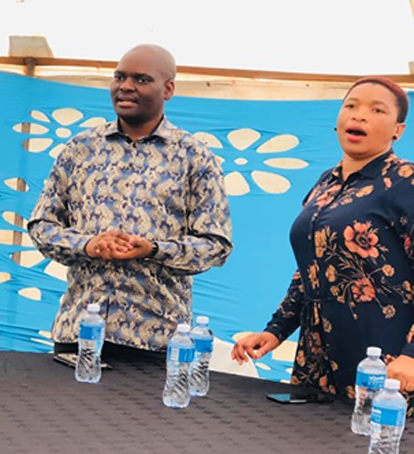



KZN Legislature Speaker Hon. Boyce donates uniforms to needy children on her birthday
In a gesture of selfless and charitable leadership, Hon. Nontembeko Boyce (MPL), Speaker of KwaZulu-Natal Legislature has used the occasion of her 44th birthday to donate school uniforms to scores of needy learners in the Ugu District, in the south of the province.
Handing over the items to jubilant learners and teachers, the 44-year-old Speaker explained that she had decided to spend time with needy learners on her birthday because the Legislature valued education and wanted to see all learners attired in a dignified manner.
“As part of our social responsibility programme, we decided to hand over these uniforms. Through this initiative we have already benefited hundreds of pupils in different parts of KwaZulu-Natal. We are providing uniforms because we know that some families face serious financial hardships which make them unable to support their children. In turn, this leads to absenteeism and even dropping out,” added Boyce.
The Speaker described the time spent with underprivileged on her birthday as immensely satisfying.
“History has taught us that it is through giving that we enrich and prolong both our own lives and the lives of others.”
The school principals and parents expressed great appreciation for the kind gesture and wished the Speaker a birthday filled with joy.
“When we heard about the legislature’s social responsibility programme that has been praised in other parts of the province, we never thought it would also come to us. We really want to thank Ms Boyce and the legislature she leads for choosing our school,” said Mbambuya Primary School Principal, Ms Tholakele Memela.
ISSUED BY THE OFFICE OF THE LEGISLATURE
Enquiries: Bongani Tembe 0823272600



